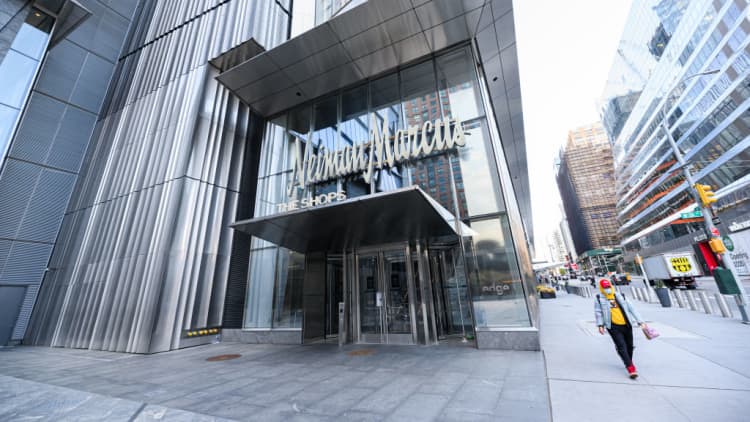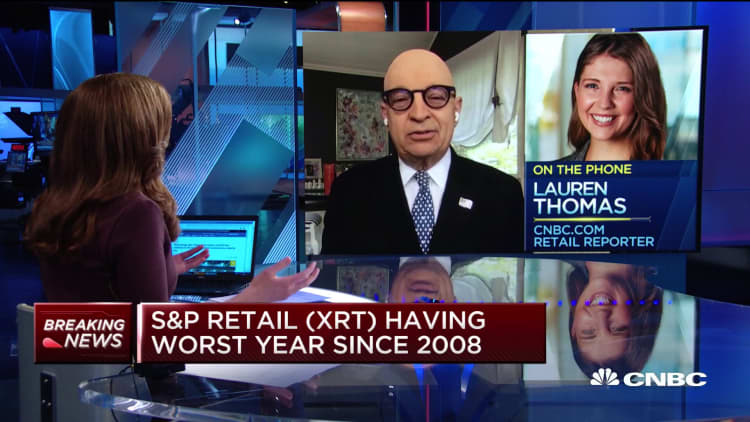
Neiman Marcus, saddled with debt and hit by the coronavirus pandemic, filed for bankruptcy on Thursday with a deal to hand its business over to its creditors.
The luxury department store chain had been struggling with competition from online rivals and dwindling cash before the outbreak. The health crisis exacerbated its problems, forcing it to furlough most of its 14,000 workers and close its 43 Neiman Marcus stores.
It is now the second major retailer to declare bankruptcy during the pandemic, following J. Crew's filing earlier this week. It is likely not the last. J.C. Penney has also been exploring filing for bankruptcy. Many others are likewise forced to cope with sales that have been cut off and uncertainty over how people will shop in the future.
"Like most businesses today, we are facing unprecedented disruption caused by the COVID-19 pandemic, which has placed inexorable pressure on our business," CEO Geoffroy van Raemdonck said in a statement.
"The binding agreement from our creditors gives us additional liquidity to operate the business during the pandemic and the financial flexibility to accelerate our transformation. We will emerge a far stronger company."
Neiman Marcus said it has secured $675 million in financing from its creditors to fund operations through bankruptcy. Those creditors have also committed to a $750 million financing package that would fully refinance that financing and provide additional liquidity for the business once it exits bankruptcy.
It expects to emerge from bankruptcy this fall, at which point its creditors will become majority owners of the business.
The bankruptcy filing will help it eliminate roughly $4 billion in debt that remains as a memento from its sale to private equity firms Ares Management and the Canada Pension Plan Investment Board in 2013.
The retailer said Thursday that it has extended temporary closures of some Neiman Marcus, Bergdorf Goodman and Last Call stores through May 31. Starting this week its stores in Atlanta and the NorthPark mall in Dallas are available to customers by private appointment.
Neiman Marcus has long been known for its upscale brand and strong customer service. Its holiday catalog, known as The Christmas Book, first hit mailboxes and doorsteps in 1939, cementing the retailer's place in many wealthy Americans' homes.
Like a number of retailers in the 2000s, it caught the eye of private equity firms eager to take advantage of what was once seen as steady retail cash flow. It sold to private equity firms TPG Capital and Warburg Pincus for $5.1 billion in 2005, before its current owners bought it eight years later.
But debt from those investments limited its ability to invest in its e-commerce business, weakening its footing as luxury players like Yoox Net-A-Porter grew in strength. Neiman Marcus' "hipper" rival, Barneys, filed for bankruptcy last year, crushed by waning sales and rent it could no longer afford.
Neiman Marcus has long been considered a likely merger partner for similarly upscale store Saks, which is owned by Hudson's Bay Co. Combined, the two could broaden their scale and stop competing for the same upscale customer. While the two have toyed with a deal before, the debt load carried by both parties has hindered their ability to come to together.
The department store industry, meantime, is expected to be among the most impacted by the coronavirus pandemic. The industry was already facing upheaval, as brands sidestepped by selling online and to shoppers directly. Many of them have been saddled with large store bases that were already uneconomical before the pandemic threatened to change the way Americans shop.
To help weather the crisis, the country's largest department stores are tapping the debt markets in moves that will likely put immense pressure on their balance sheets for years to come. Macy's has been looking at raising up to $5 billion in debt, CNBC has reported. Nordstrom has issued $600 million in secured debt financing, in addition to drawing down $800 million on its revolving line of credit.

Correction: Ares Management and the Canada Pension Plan Investment Board bought Neiman Marcus eight years after it sold to TPG Capital and Warburg Pincus. An earlier version misstated the time frame.



